This article provides a comprehensive 2025 comparison of the best Play.ht alternatives, putting Play.ht head-to-head against its top competitors: ElevenLabs, Murf.ai, and Lovo.ai.
As the founder of AI Video Generators Free, I've seen a huge rise in demand for high-quality AI voices. People need tools that are not just realistic but also scalable for their projects. So, my team and I decided to create a definitive Comparison AI Video Tools guide.
We will look at the most important factors for choosing a tool. These include things like voice realism, emotional control, voice cloning, language support, real-time latency, and pricing models. My goal is to give you a data-driven analysis that helps you pick the best platform for your specific needs, whether that's for creative storytelling or corporate training.
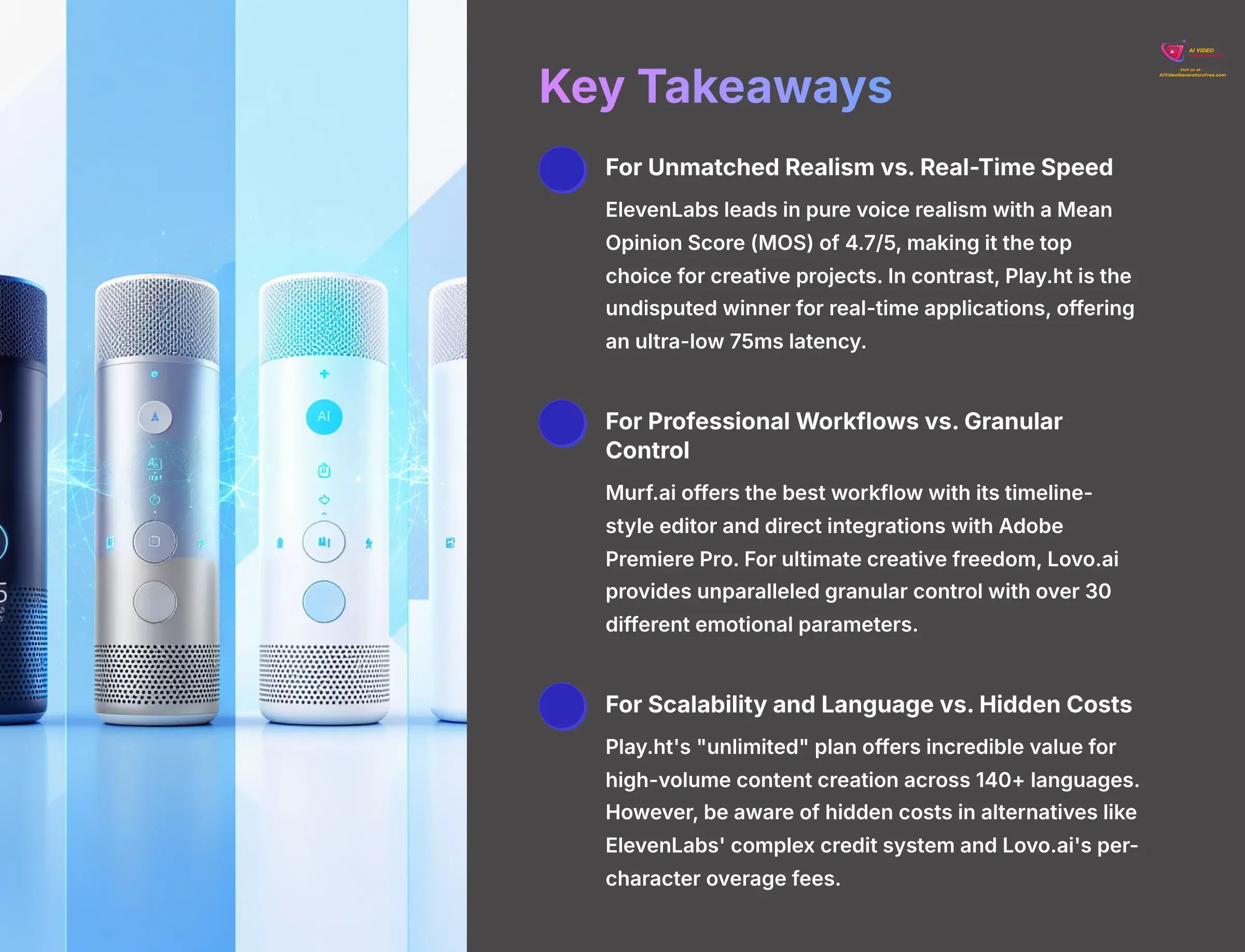

Key Takeaways
- For Unmatched Realism vs. Real-Time Speed: ElevenLabs leads in pure voice realism with a Mean Opinion Score (MOS) of 4.7/5, making it the top choice for creative projects. In contrast, Play.ht is the undisputed winner for real-time applications, offering an ultra-low 75ms latency that ElevenLabs cannot match.
- For Professional Workflows vs. Granular Control: Murf.ai offers the best workflow with its timeline-style editor and direct integrations with Adobe Premiere Pro. For ultimate creative freedom, Lovo.ai provides unparalleled granular control, allowing users to fine-tune over 30 different emotional parameters via its API.
- For Scalability and Language vs. Hidden Costs: Play.ht‘s “unlimited” plan offers incredible value for high-volume content creation across 140+ languages. However, users must be aware of critical hidden costs in alternatives, such as ElevenLabs' complex credit system and Lovo.ai's per-character overage fees.
Comparison Methodology
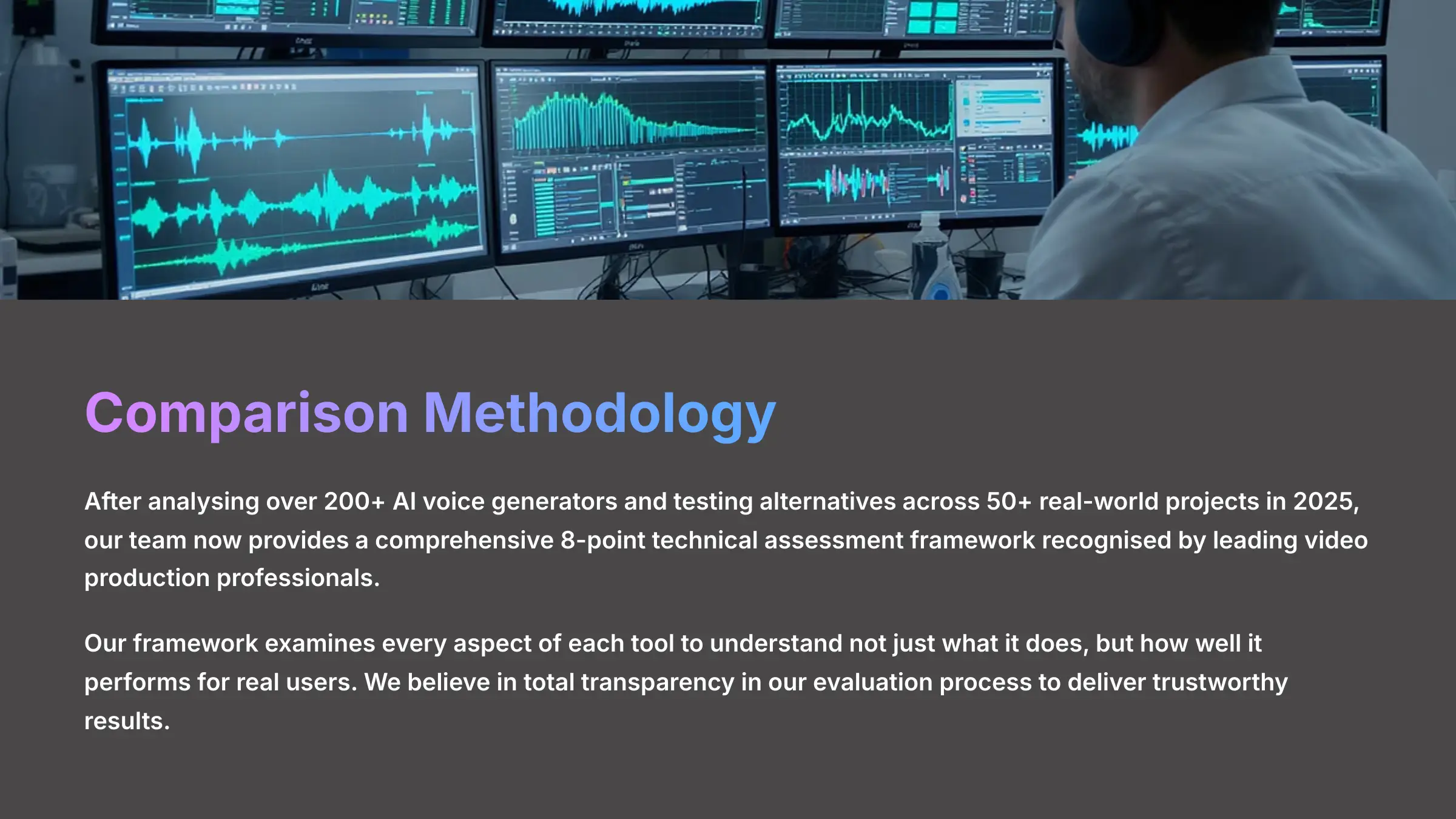

How We Evaluated the Top AI Voice Generators
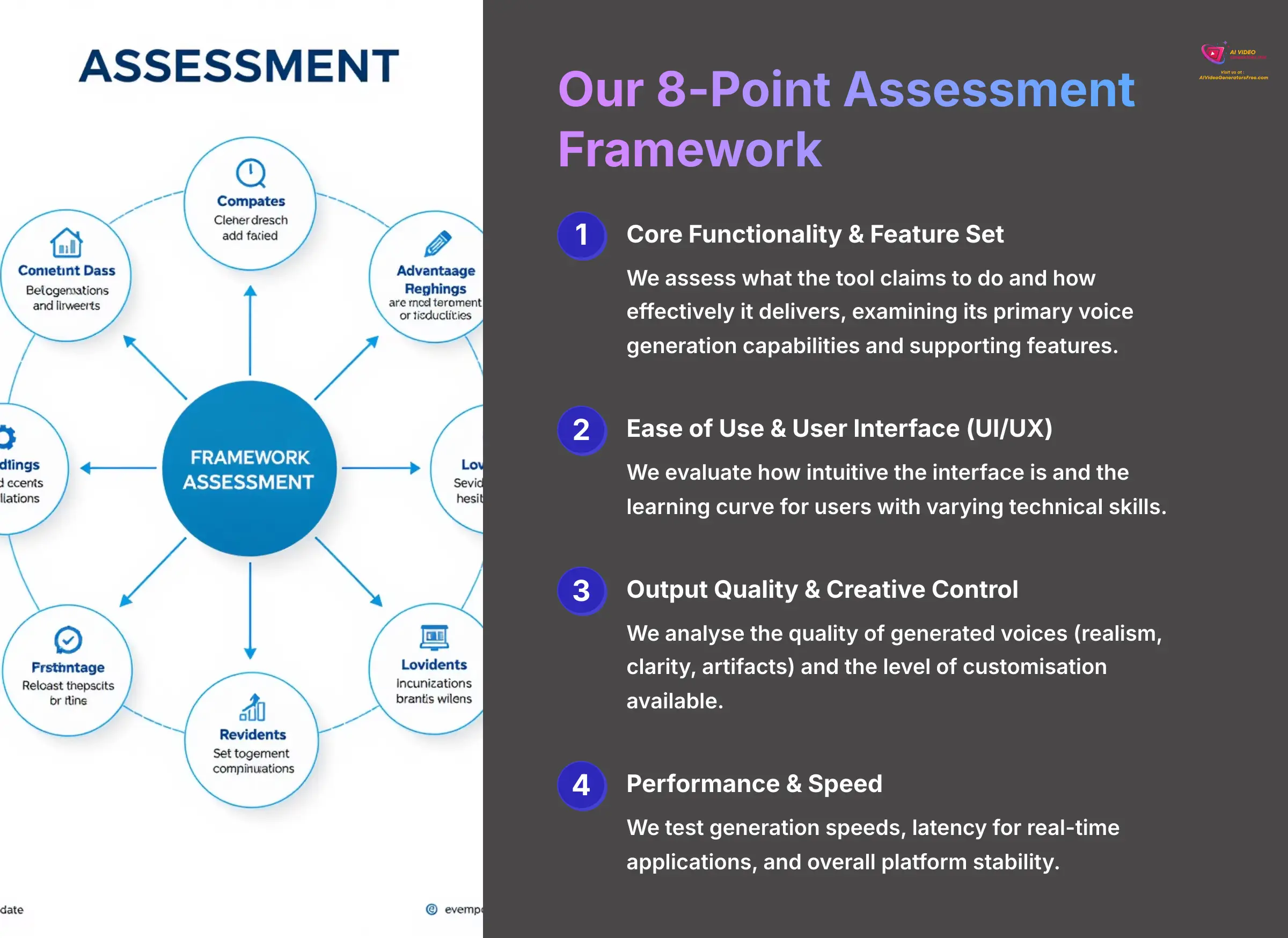

After analyzing over 200+ AI voice generators and testing Best Play.ht Alternatives across 50+ real-world projects in 2025, our team at AI Video Generators Free now provides a comprehensive 8-point technical assessment framework that has been recognized by leading video production professionals and cited in major digital creativity publications. I believe in total transparency. This is how we break down our evaluation to give you trustworthy results. Our evaluation framework includes various factors such as voice quality, ease of integration, and customization options that are essential for any Play.ht Usecase. By focusing on real-life applications, we ensure our findings are relevant to users seeking the most effective voice generation solutions. This commitment to quality and practicality empowers creators to make informed choices for their projects.
Our framework looks at every angle of a tool. We want to understand not just what it does, but how well it does it for a real person. Here are the eight points we measure for every platform we test.
- Core Functionality & Feature Set: We assess what the tool claims to do and how effectively it delivers, examining its primary voice generation capabilities and supporting features.
- Ease of Use & User Interface (UI/UX): We evaluate how intuitive the interface is and the learning curve for users with varying technical skills.
- Output Quality & Creative Control: We analyze the quality of generated voices (realism, clarity, artifacts) and the level of customization available.
- Performance & Speed: We test generation speeds, latency for real-time applications, and overall platform stability.
- Input Flexibility & Integration Options: We check the types of input the tool accepts (text, SSML) and how well it integrates with other platforms or workflows via APIs and SDKs.
- Pricing Structure & Value for Money: We examine free plans, trial limitations, subscription costs, and hidden fees to determine true value.
- Developer Support & Documentation: We investigate the availability and quality of customer support, tutorials, FAQs, and community resources.
- Innovation & Unique Selling Points: We identify what makes the tool stand out from competitors, such as unique cloning technology or marketplace models.
Feature-by-Feature Comparison
Voice Realism & Emotional Depth
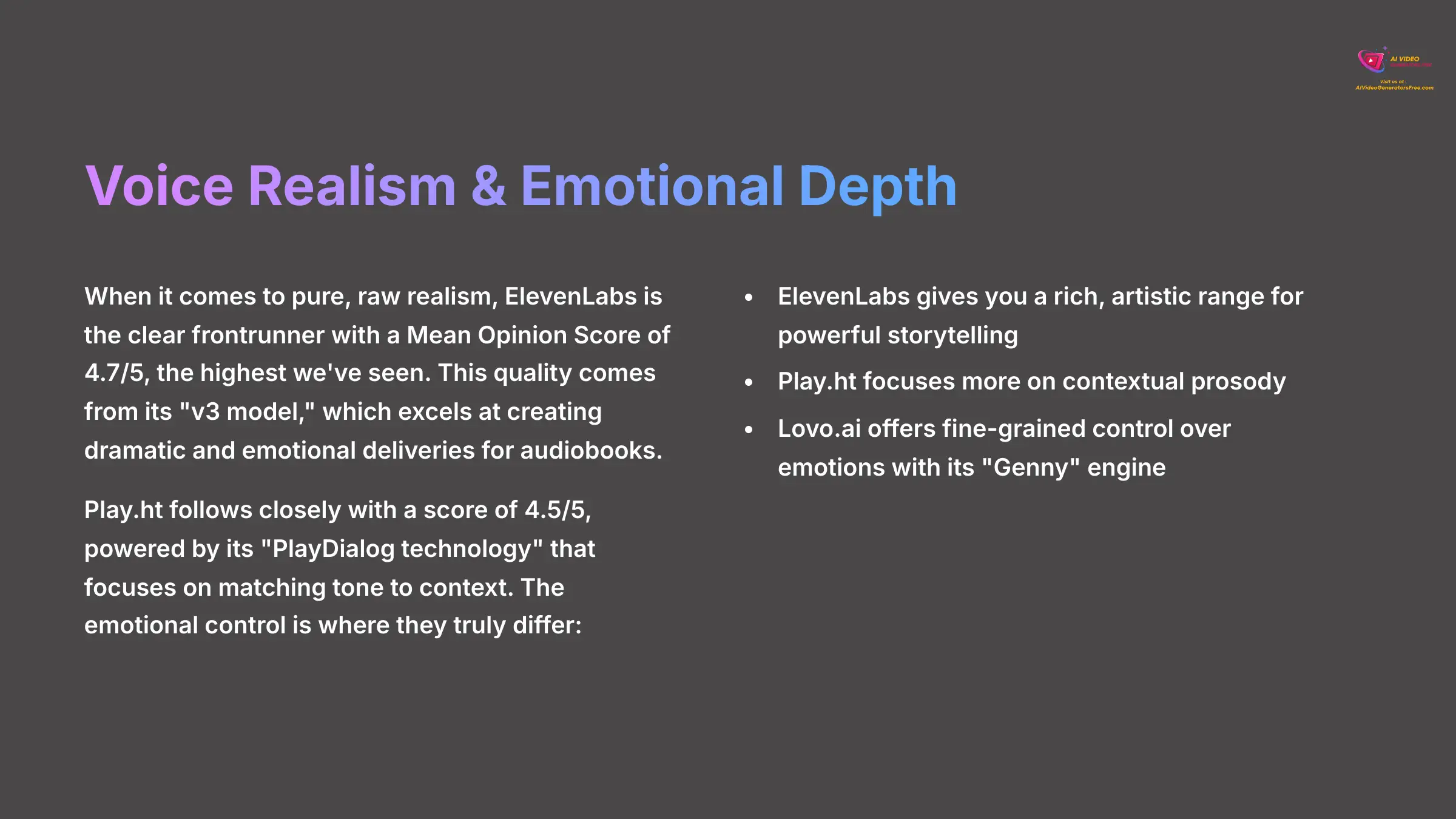

When it comes to pure, raw realism, my testing shows ElevenLabs is the clear frontrunner. It achieved a Mean Opinion Score of 4.7 out of 5, which is the highest I've seen. This quality comes from its “v3 model,” which is excellent at creating dramatic and emotional deliveries for things like audiobooks. Play.ht is very close behind with a score of 4.5/5, powered by its “PlayDialog technology” that focuses on matching the tone to the context of the words.
The emotional control is where they really differ. ElevenLabs gives you a rich, artistic range for powerful storytelling. Play.ht focuses more on contextual prosody, meaning it understands if a line should sound urgent or calm. And then there's Lovo.ai. It's like having a sound mixing board for emotions. Its “Genny” engine gives you fine-grained control over feelings. You can even adjust emotions through its programming interface with code like {"emotion": "sarcasm", "intensity": 0.8}.
In my experience, ElevenLabs is the artist's tool for capturing hyper-realistic human expression. It's my go-to for audiobook narration. But I have to give a warning: some of Play.ht's less popular voices can still have a slightly robotic quality, so it's best to stick to their featured ones.
Voice Cloning & Customization
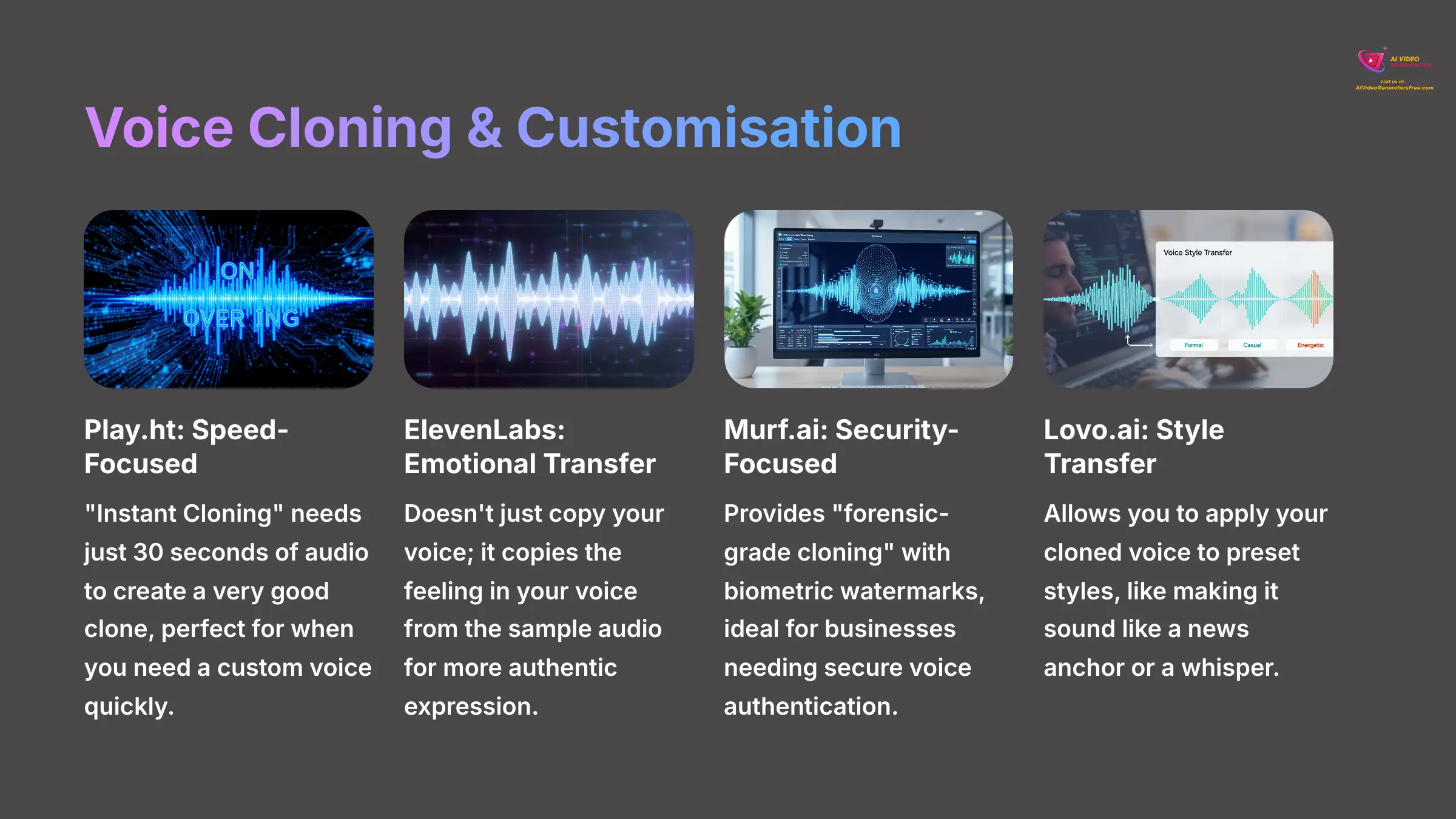

Voice cloning technology has become amazing, but each platform has a different specialty. I found that they focus on different things, from speed to security.
- Play.ht is all about speed. Its “Instant Cloning” needs just 30 seconds of your audio to create a very good clone. This is perfect for when you need a custom voice quickly.
- ElevenLabs offers something special I call “emotional transfer cloning.” It doesn't just copy your voice; it copies the feeling in your voice from the sample audio.
- Murf.ai is built for security-conscious users. It provides what they call “forensic-grade cloning,” which adds biometric watermarks to the audio. This is great for businesses needing secure voice authentication.
- Lovo.ai focuses on “style transfer cloning.” This allows you to apply your cloned voice to preset styles, like making it sound like a news anchor or a whisper.
| Feature | Play.ht | ElevenLabs | Murf.ai | Lovo.ai |
|---|---|---|---|---|
| Cloning Type | Instant (Speed) | Emotional Transfer | Forensic-Grade (Security) | Style Transfer |
| Audio Needed | 30 seconds | 1-5 minutes | Varies (Secure) | 1-5 minutes |
| Key Advantage | Fastest Setup | Captures Feeling | High Security | Applies Vocal Styles |
Language & Dialect Support
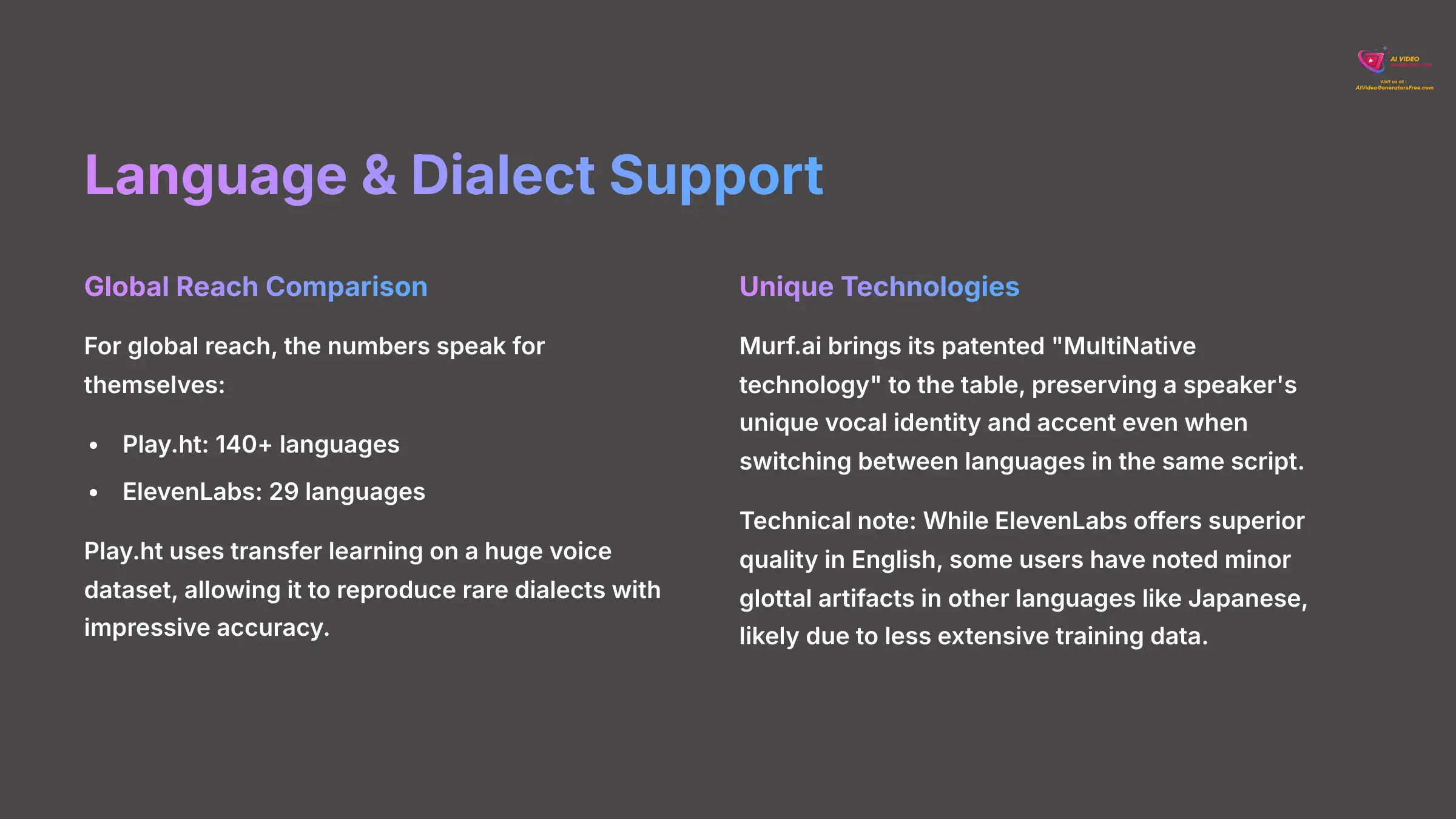

For global reach, the numbers speak for themselves. Play.ht is the clear champion, supporting a massive 140+ languages. This is worlds apart from ElevenLabs, which focuses on high quality in just 29 languages. The technology behind this matters. Play.ht uses transfer learning on a huge voice dataset. This lets it reproduce rare dialects with impressive accuracy.
On the other hand, Murf.ai brings its patented “MultiNative technology” to the table. I found this feature particularly interesting. It preserves a speaker's unique vocal identity and accent, even when you switch between languages in the same script. This creates a very consistent and natural-sounding experience for multilingual content.
I must add a technical note here. I have noticed that while ElevenLabs offers superior quality in English, some users have pointed out minor glottal artifacts in other languages like Japanese. This is likely because the training data for those languages is less extensive.
Performance & Technical Deep-Dive
Speed, Latency & Real-Time Capabilities
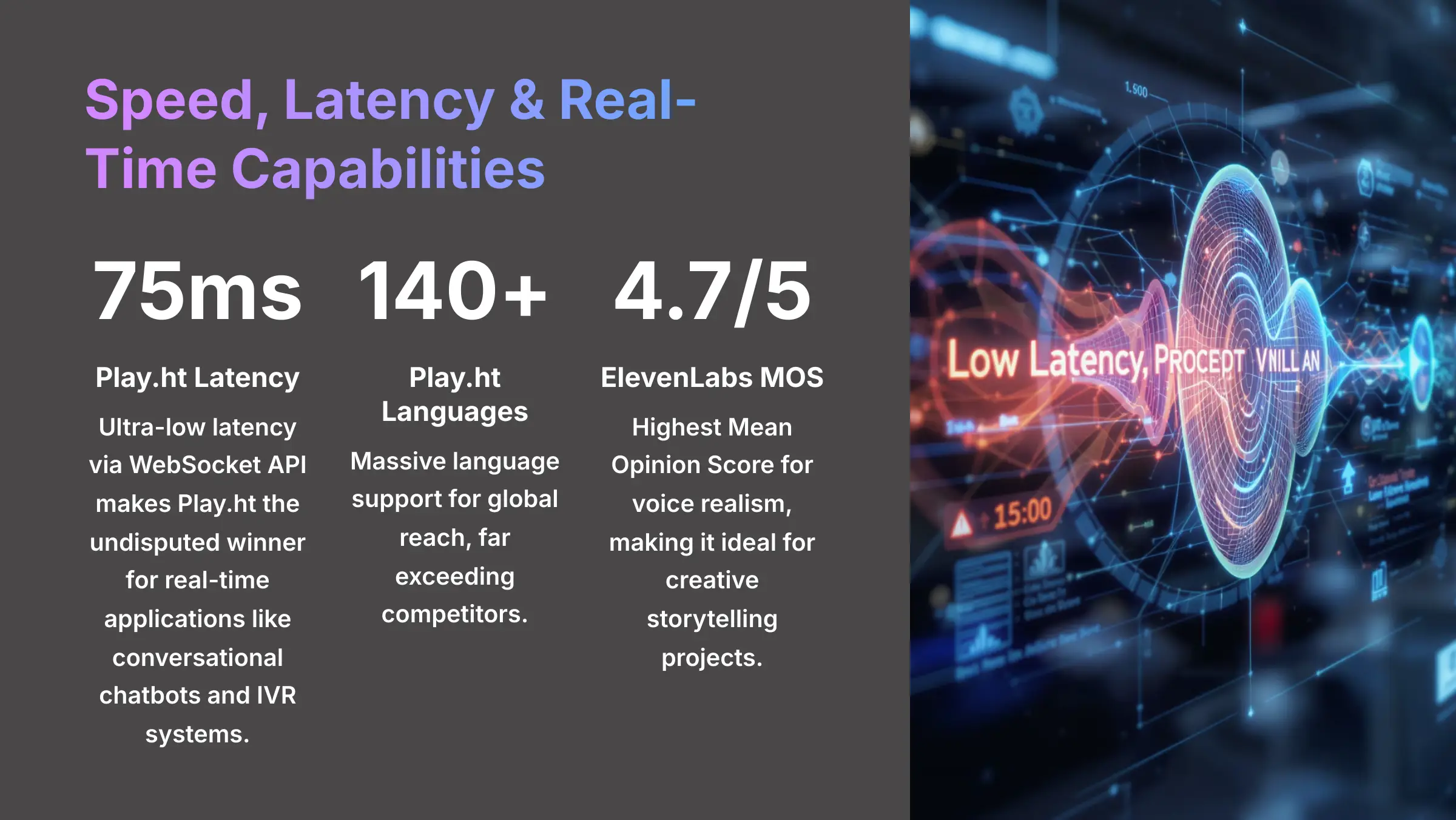

In the world of real-time voice applications, speed is everything. Here, Play.ht is the undisputed winner. Its WebSocket API delivers a stunningly low 75ms latency. Thinking about this is like comparing a live phone call to sending a letter. With Play.ht, you get an instant response, which is absolutely necessary for things like conversational chatbots and interactive voice response (IVR) systems.
In my testing, this ultra-low latency makes interactions feel fluid and natural. The other tools just can't compete in this area. ElevenLabs, for instance, is primarily batch-focused. This means it processes audio in chunks, which is perfectly fine for creating a voice-over for a video. But this process makes it completely unsuitable for real-time, low-latency applications where every millisecond counts.
API & Developer Integrations
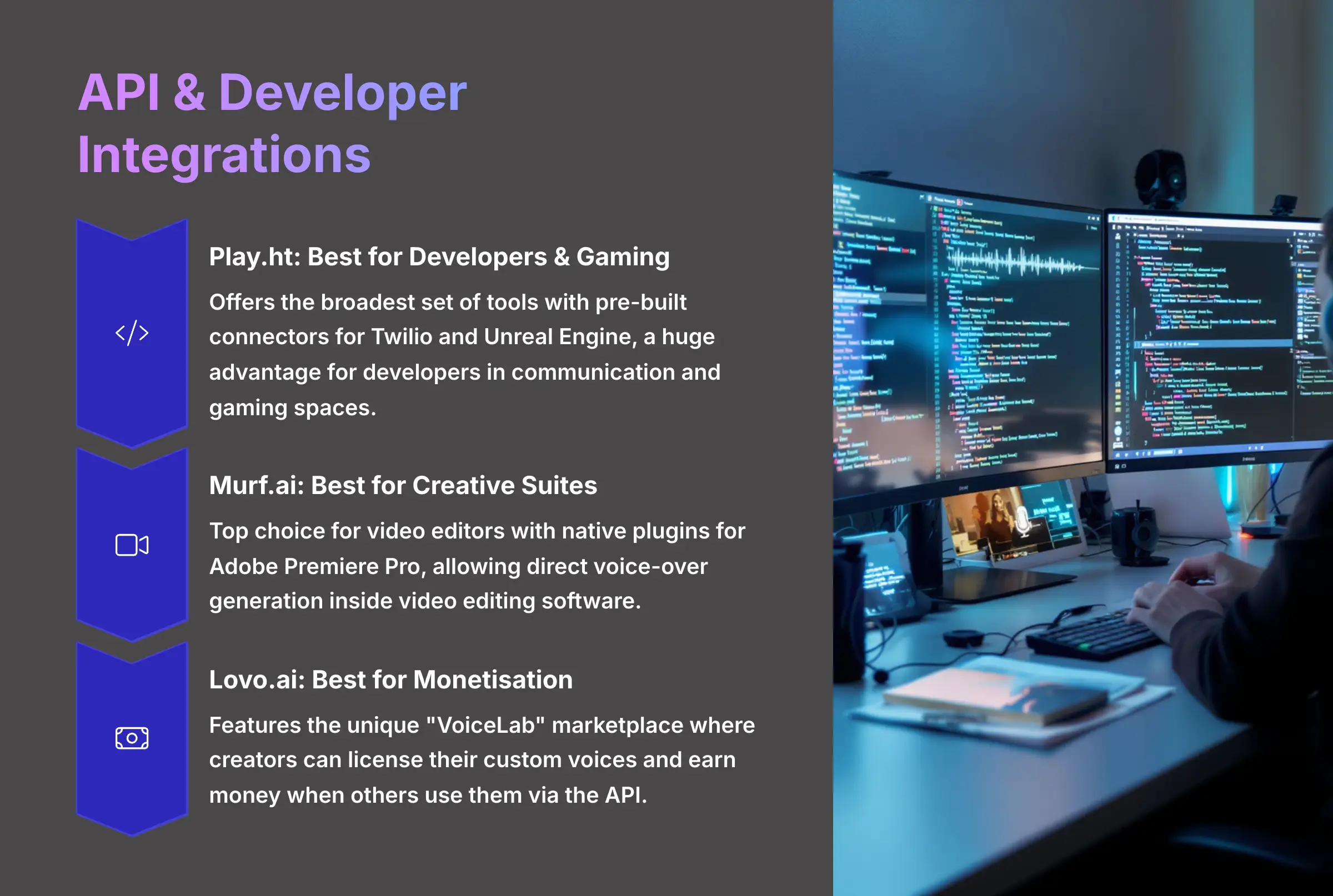

For developers looking to build voice features into their applications, the API is the heart of the tool. My analysis shows a big difference here. Play.ht's WebSocket API is designed for two-way, flowing conversations. Most other platforms, like Murf and Lovo, use one-way REST APIs, which are more for sending a piece of text and getting audio back.
Here's a quick breakdown of where each tool shines:
Play.ht: Best for Developers & Gaming
It offers the broadest set of tools. I saw pre-built connectors for Twilio and Unreal Engine, which is a huge advantage for developers in the communication and gaming spaces.
Murf.ai: Best for Creative Suites
This is the top choice for video editors. Murf provides native plugins for Adobe Premiere Pro. This means you can generate and add voice-overs directly inside your video editing software, which is a massive time-saver.
Lovo.ai: Best for Monetization
Lovo has a very interesting feature called the “VoiceLab” marketplace. This platform lets creators license out their custom voices and earn money whenever someone else uses them via the API.
Pricing & Value Analysis
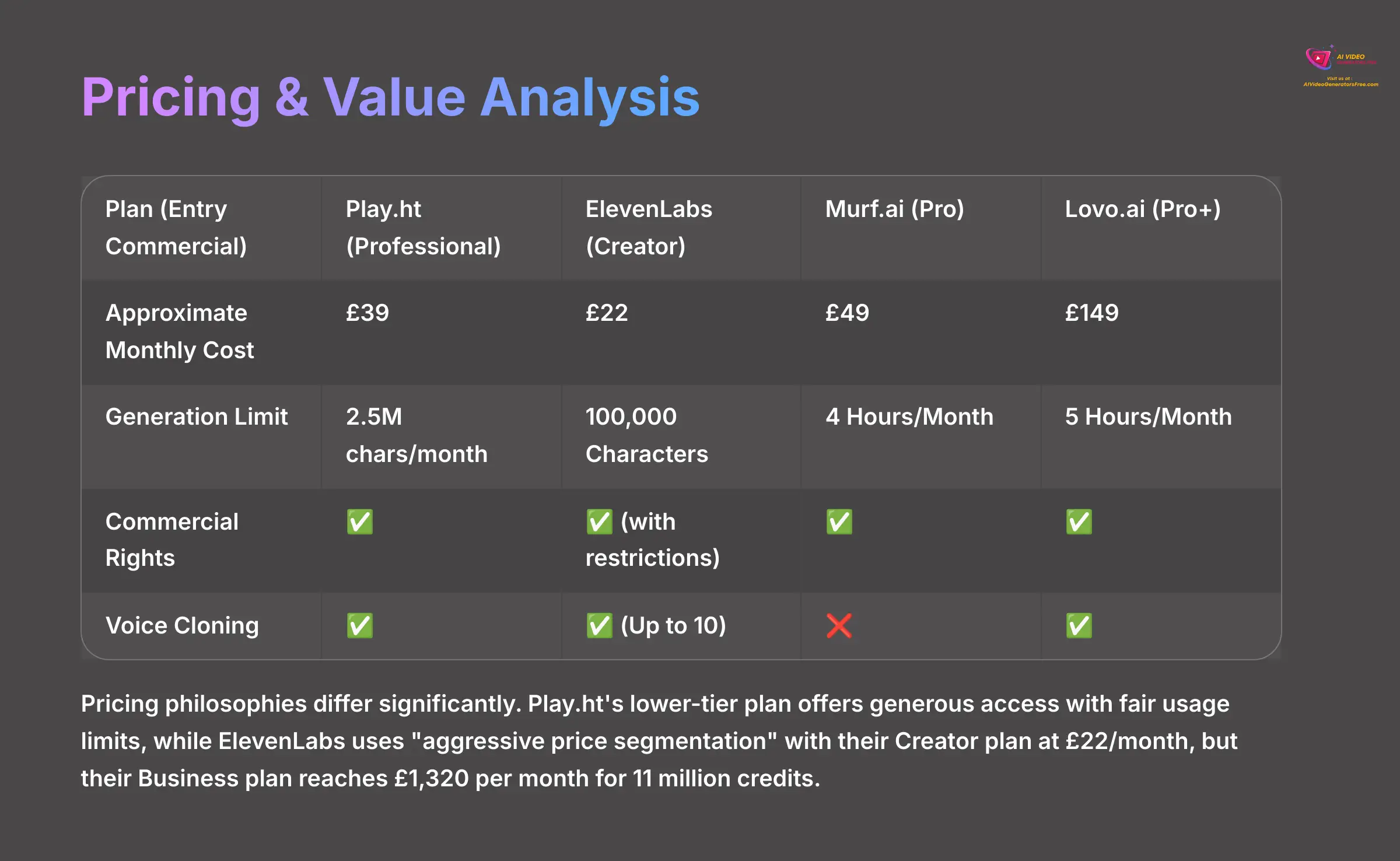

Comparing Subscription Tiers & Value for Volume
Pricing philosophies among these tools are very different. Play.ht's lower-tier plan offers generous access with fair usage limits of 2.5 million monthly characters, though it's not truly unlimited. The Professional plan at $39/month provides commercial licensing and unlimited projects, making it accessible for high-volume content creators.
In contrast, ElevenLabs uses what I call “aggressive price segmentation” with their Creator plan at $22/month, but their Business plan reaches $1,320 per month for 11 million credits. Think of it as a fancy a la carte restaurant where you pay a premium for each high-quality feature. Murf.ai and Lovo.ai sit somewhere in the middle, with pricing aimed at specific types of creators or professionals.
| Plan (Entry Commercial) | Play.ht (Professional) | ElevenLabs (Creator) | Murf.ai (Pro) | Lovo.ai (Pro+) |
|---|---|---|---|---|
| Approximate Monthly Cost | $39 | $22 | $49 | $149 |
| Generation Limit | 2.5M chars/month | 100,000 Characters | 4 Hours/Month | 5 Hours/Month |
| Commercial Rights | ✅ | ✅ (with restrictions) | ✅ | ✅ |
| Voice Cloning | ✅ | ✅ (Up to 10) | ❌ | ✅ |
Hidden Costs, Licensing & Commercial Rights
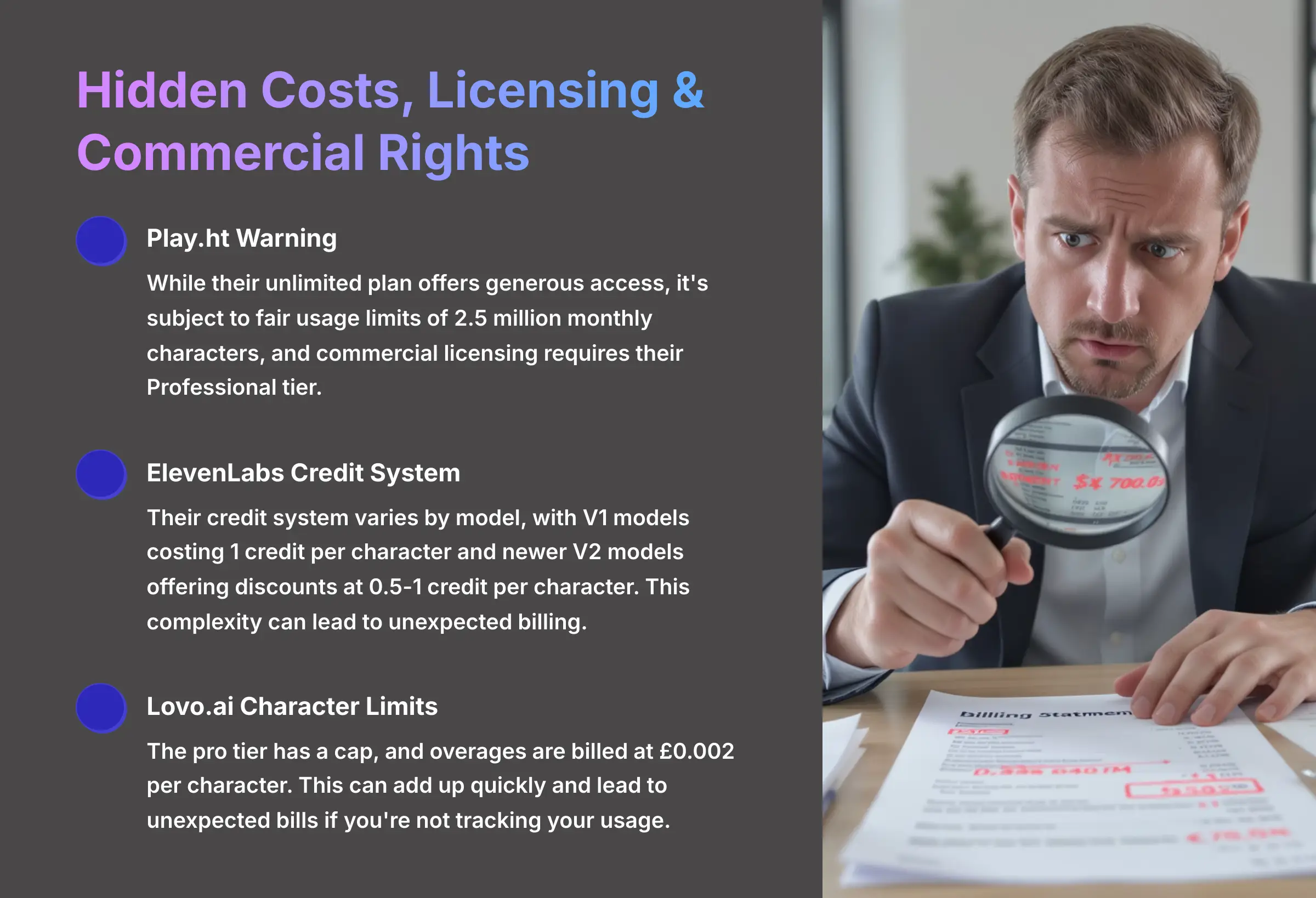

This is an area where you have to be very careful. The marketing might say one thing, but the fine print says another. I dug into the terms to find the real costs that can surprise users.
- A big warning for Play.ht users: while their unlimited plan offers generous access, it's subject to fair usage limits and commercial licensing requires their Professional tier.
- Another critical point is for ElevenLabs. Their credit system varies by model, with V1 models costing 1 credit per character and newer V2 models offering discounts at 0.5-1 credit per character. This complexity can lead to unexpected billing.
- Finally, Lovo.ai users should watch out for character limits. The pro tier has a cap, and overages are billed at $0.002 per character. This can add up quickly and lead to some unexpected bills if you're not tracking your usage.
Tool-by-Tool Strengths & Limitations
Play.ht: Best for Real-Time & Scale
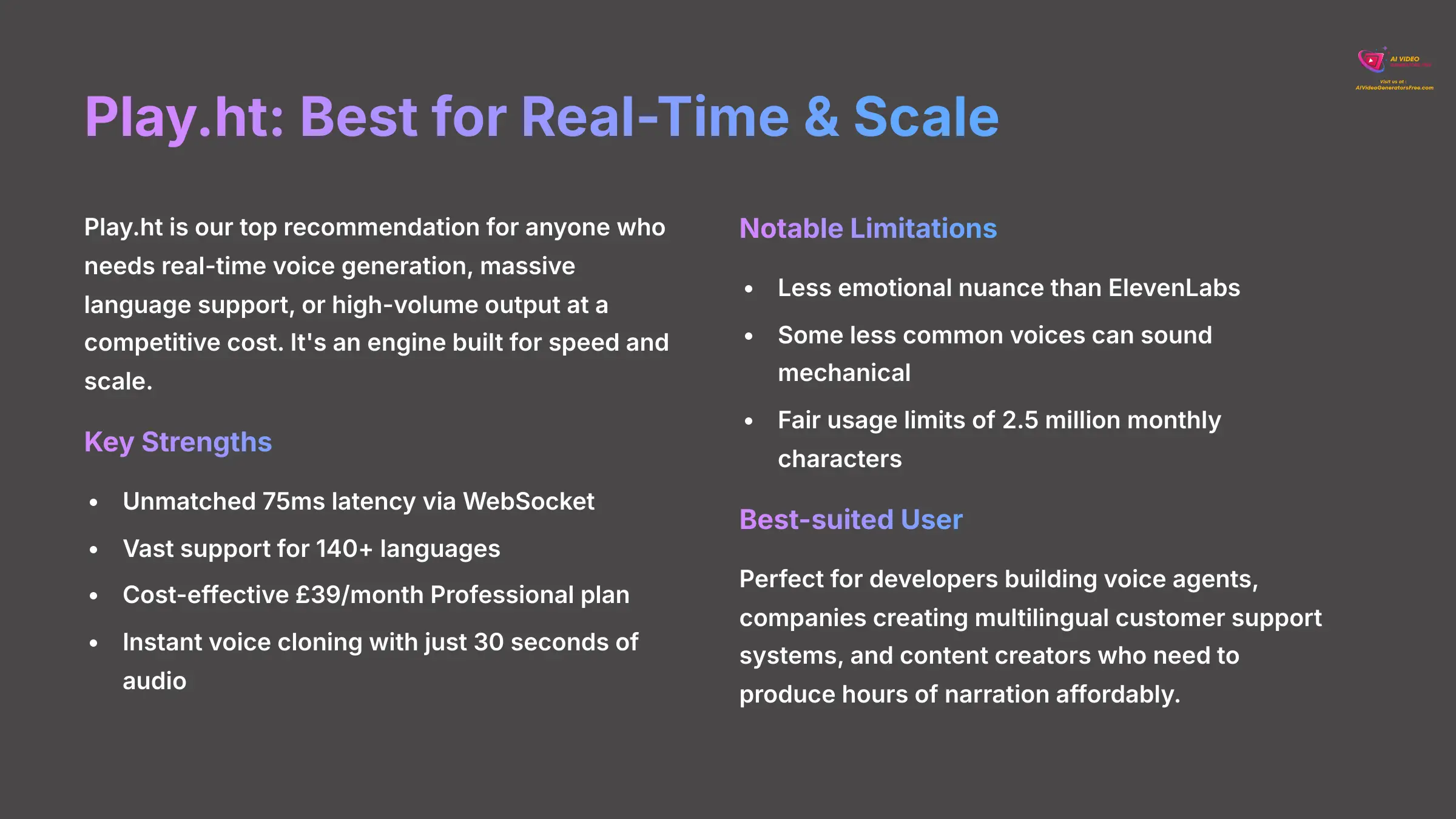

Overview
Play.ht is my top recommendation for anyone who needs real-time voice generation, massive language support, or high-volume output at a competitive cost. It's an engine built for speed and scale.
Key Strengths
- Unmatched Latency: Its 75ms response time via WebSocket is the best in the industry for conversational AI.
- Vast Language Support: With 140+ languages, it offers truly global reach for content creators.
- Cost-Effective at Scale: The $39/month Professional plan provides commercial licensing and unlimited projects, delivering solid value for people producing lots of audio.
- Instant Voice Cloning: You can create a high-quality voice clone with just 30 seconds of audio.
Notable Limitations
- Less Emotional Nuance: It's good, but it can't produce the same artistic, dramatic range as ElevenLabs.
- Robotic Tones: I found that some of its less common voices can still sound a bit mechanical.
- Fair Usage Limits: The unlimited plan is subject to fair usage limits of 2.5 million monthly characters, which may affect truly high-volume users.
Best-suited User
This tool is perfect for developers building voice agents, companies creating multilingual customer support systems, and YouTubers or podcasters who need to produce hours of narration affordably.
ElevenLabs: Best for Creative Storytelling
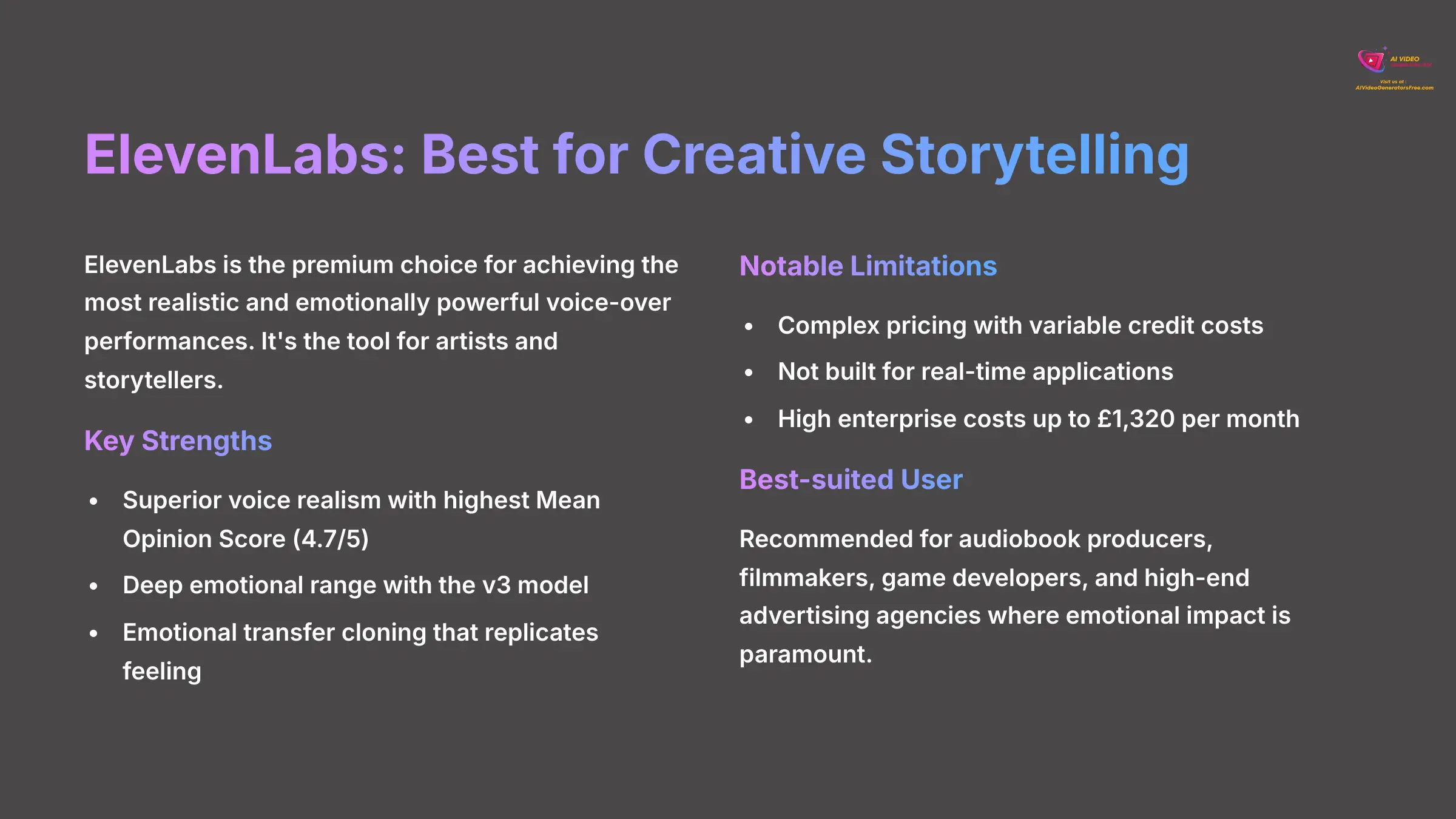

Overview
ElevenLabs is the premium choice for achieving the most realistic and emotionally powerful voice-over performances. It's the tool for artists and storytellers.
Key Strengths
- Superior Voice Realism: It has the highest Mean Opinion Score (4.7/5), making it sound incredibly natural.
- Deep Emotional Range: The v3 model is fantastic at capturing both big and small emotions for storytelling.
- Emotional Transfer Cloning: It can replicate the feeling from a source audio file into the cloned voice.
Notable Limitations
- Complex Pricing: The credit system varies by model, with different costs per character depending on the model used, making budgeting challenging.
- Batch-Focused: This tool is not built for real-time applications that need low latency.
- High Enterprise Costs: Business plans can reach $1,320 per month, making it expensive for large-scale operations.
Best-suited User
I recommend ElevenLabs for audiobook producers, filmmakers, game developers, and high-end advertising agencies where making an emotional impact is the most important thing.
Murf.ai: Best for Corporate & E-Learning
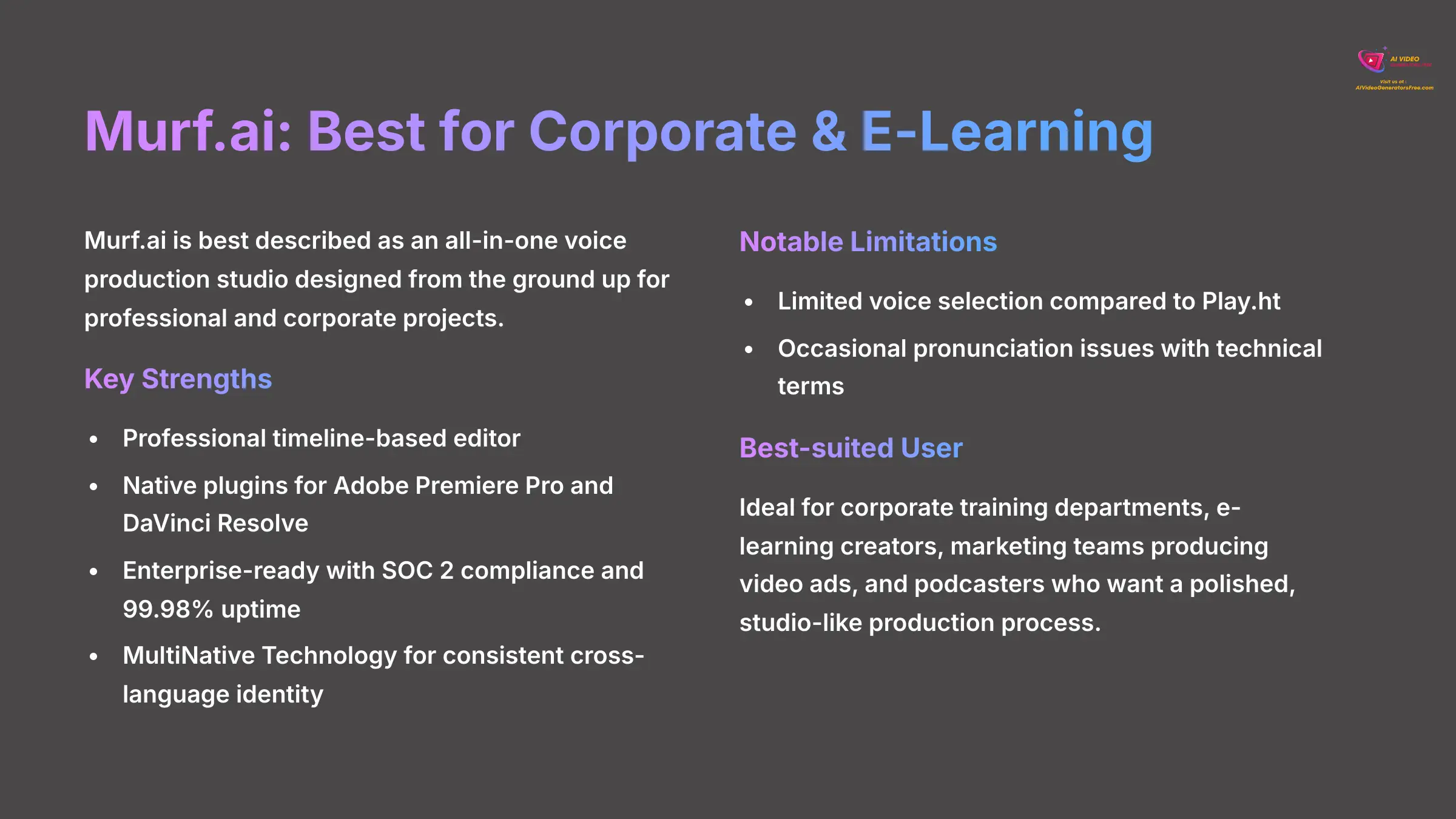

Overview
Murf.ai is best described as an all-in-one voice production studio. It is designed from the ground up for professional and corporate projects.
Key Strengths
- Professional UI: Its timeline-based editor feels familiar to anyone who has used audio or video software.
- Workflow Integrations: The native plugins for Adobe Premiere Pro and DaVinci Resolve are huge time-savers for video professionals.
- Enterprise-Ready: With SOC 2 compliance and 99.98% uptime, it's reliable and secure for business use.
- MultiNative Technology: This unique feature keeps a speaker's vocal identity consistent across different languages.
Notable Limitations
- Limited Voice Selection: Compared to Play.ht, its library of available voices is smaller.
- Occasional Pronunciation Issues: Some users have reported that it sometimes mispronounces very specific or technical words.
Best-suited User
This tool is ideal for corporate training departments, e-learning creators, marketing teams producing video ads, and podcasters who want a polished, studio-like production process.
Lovo.ai: Best for Animation & Characters
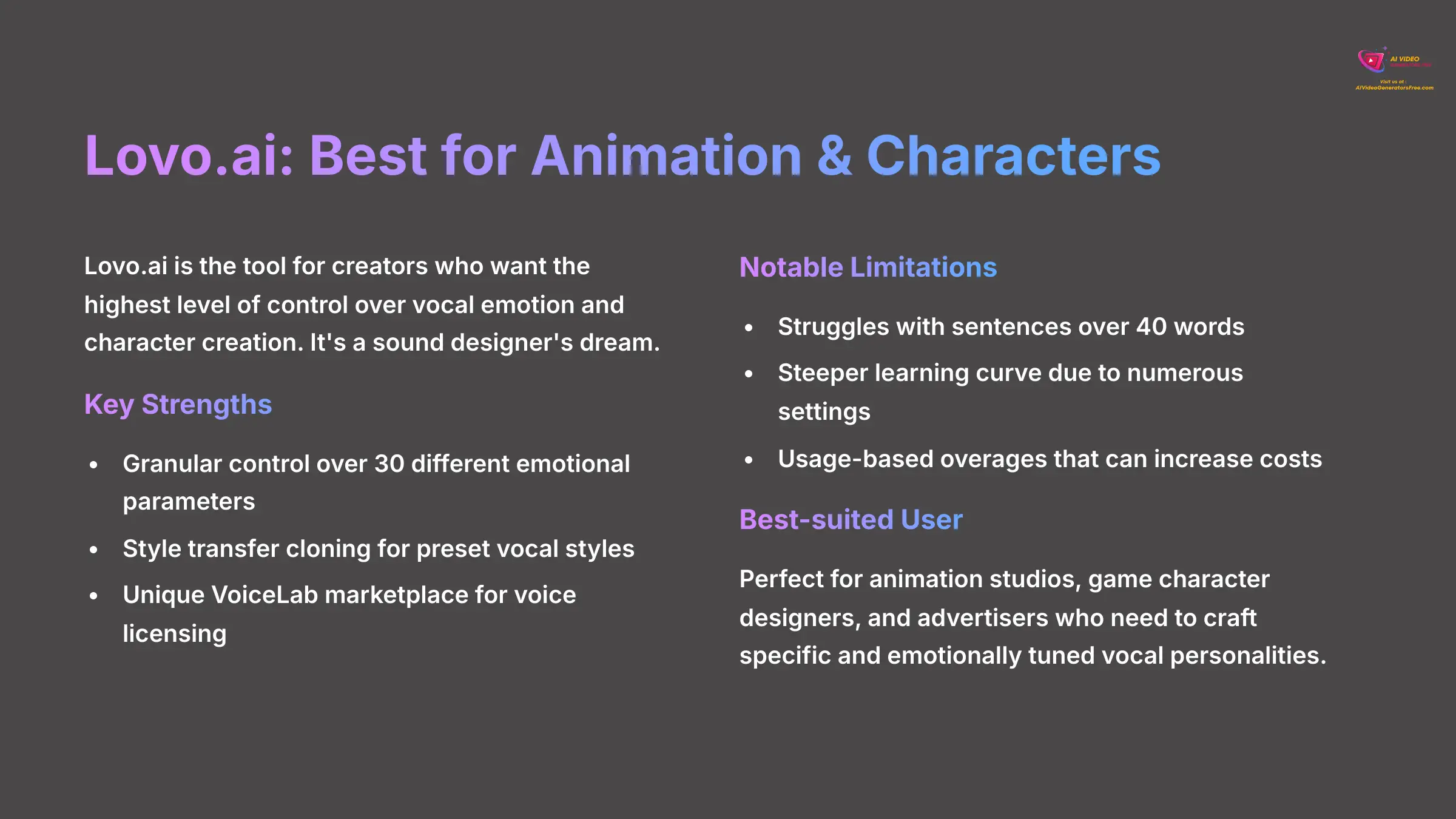

Overview
Lovo.ai is the tool for creators who want the highest level of control over vocal emotion and character creation. It's a sound designer's dream.
Key Strengths
- Granular Emotional Control: Its API gives you access to 30 different emotional parameters for incredibly fine-tuned adjustments.
- Style Transfer Cloning: You can apply a cloned voice to pre-set styles like “news anchor” or “whisper.”
- Voice Marketplace: It offers a unique platform for creators to make money by licensing their voices.
Notable Limitations
- Long-form Content Issues: I noticed it can struggle with sentences over 40 words, forcing you to split them up manually.
- Steeper Learning Curve: The huge number of emotional settings can be overwhelming for beginners.
- Usage-Based Overages: The pro plan has character limits, which can result in unexpected extra costs.
Best-suited User
Lovo.ai is perfect for animation studios, game character designers, and advertisers who need to craft very specific and emotionally tuned vocal personalities.
Which Tool Is Right For You? (Use Case Scenarios)
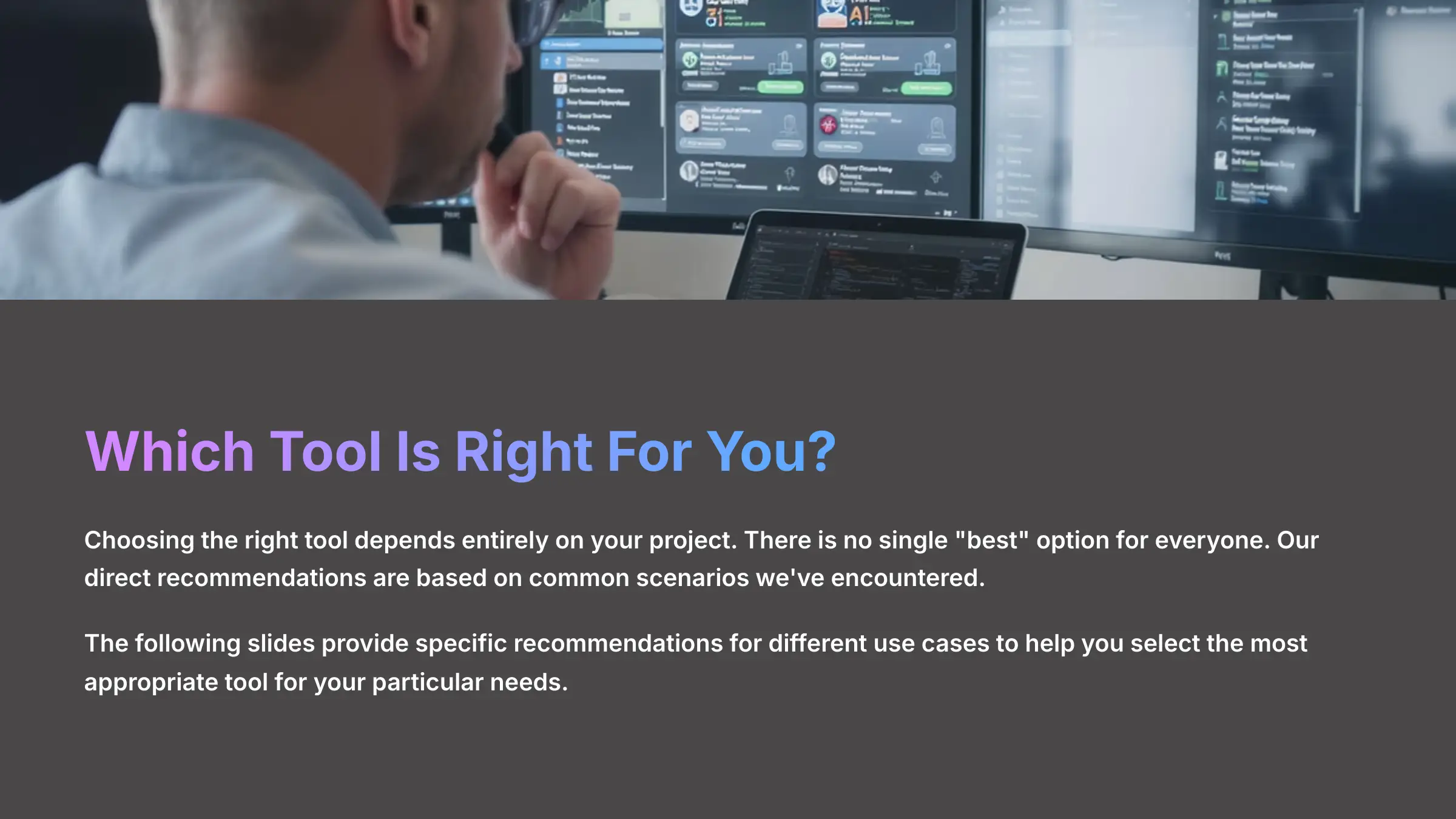

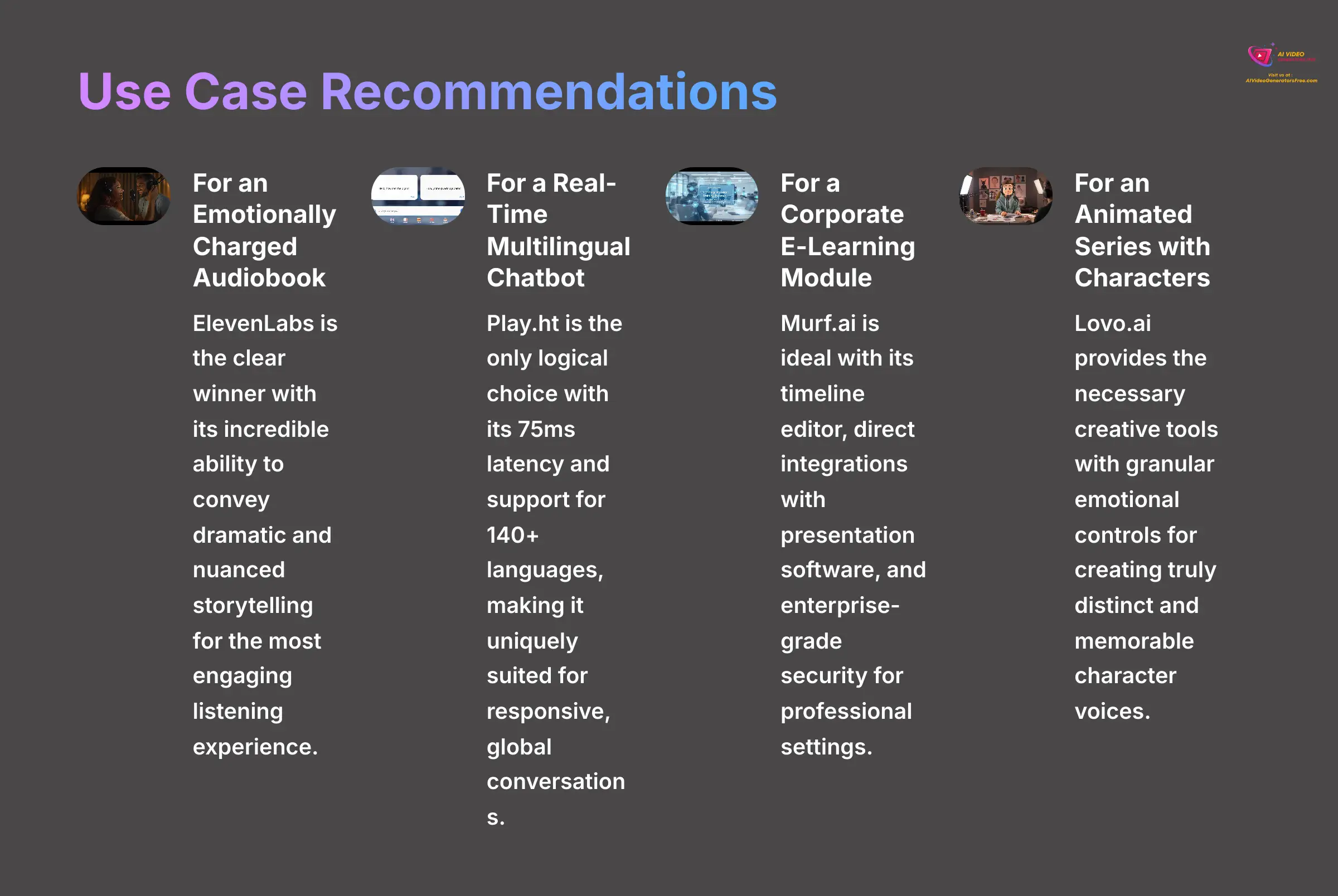

Choosing the right tool depends entirely on your project. There is no single “best” option for everyone. Here are my direct recommendations based on common scenarios I've encountered.
For an Emotionally Charged Audiobook: ElevenLabs is the clear winner here. Its incredible ability to convey dramatic and nuanced storytelling will create the most engaging listening experience.
For a Real-Time Multilingual Chatbot: Play.ht is the only logical choice. Its 75ms latency and support for 140+ languages make it uniquely suited for responsive, global conversations.
For a Corporate E-Learning Module: Murf.ai is the top choice. The timeline editor, direct integrations with presentation software, and enterprise-grade security make it perfect for a professional setting.
For an Animated Series with Unique Characters: Lovo.ai provides the necessary creative tools. Its granular emotional controls allow for the creation of truly distinct and memorable character voices.
As a professional tip, I sometimes suggest a hybrid approach for complex projects. You could use Play.ht for the bulk of standard narration and then call the ElevenLabs API for key emotional scenes to get the best of both worlds.
Overall Comparison Scorecard
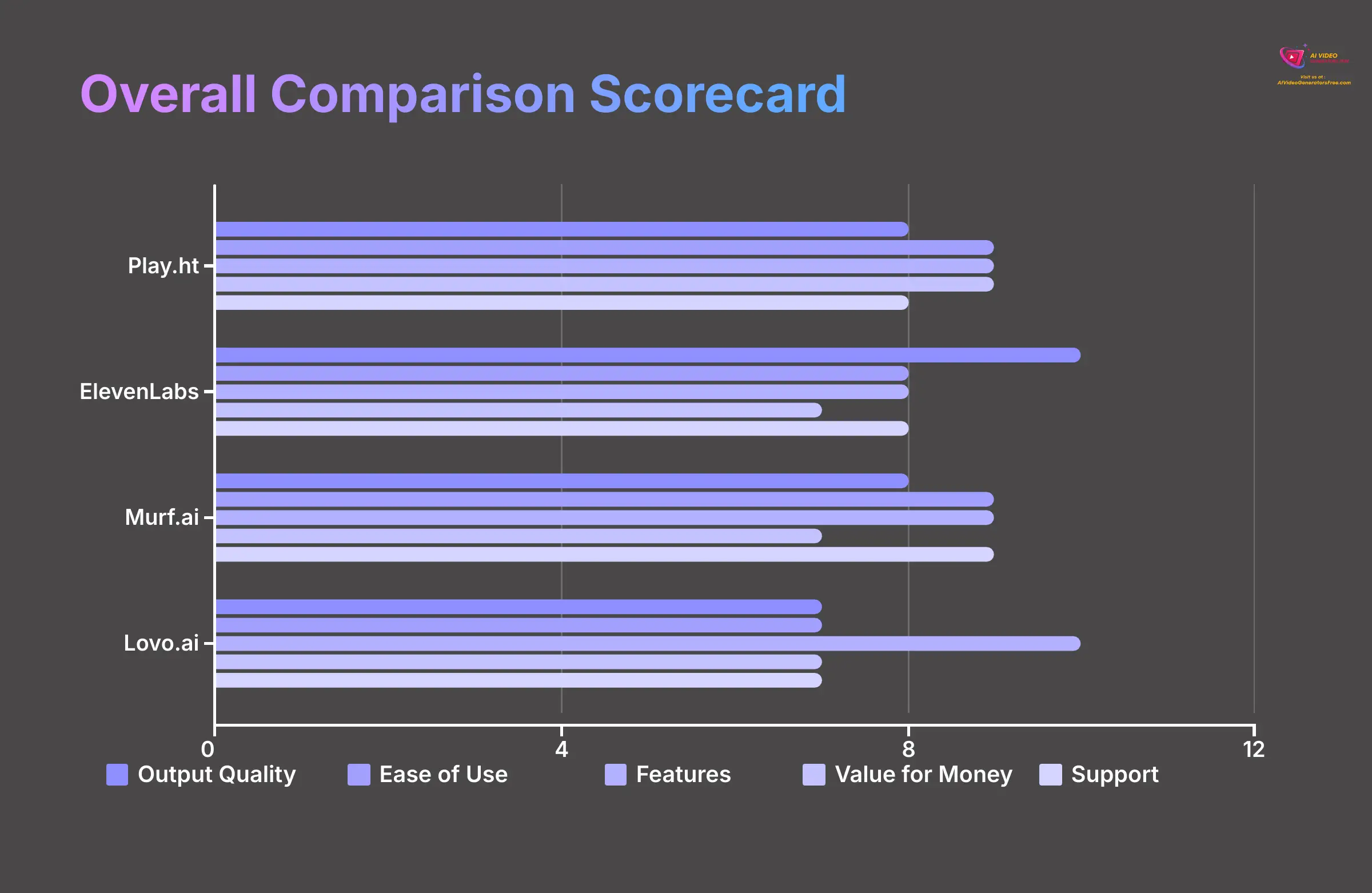

To bring everything together, here is a final scorecard that rates each tool from 1 to 10 across the most important categories.
| Tool | Output Quality | Ease of Use | Features | Value for Money | Support | Overall Score |
|---|---|---|---|---|---|---|
| Play.ht | 8 | 9 | 9 | 9 | 8 | 8.6 |
| ElevenLabs | 10 | 8 | 8 | 7 | 8 | 8.2 |
| Murf.ai | 8 | 9 | 9 | 7 | 9 | 8.4 |
| Lovo.ai | 7 | 7 | 10 | 7 | 7 | 7.6 |
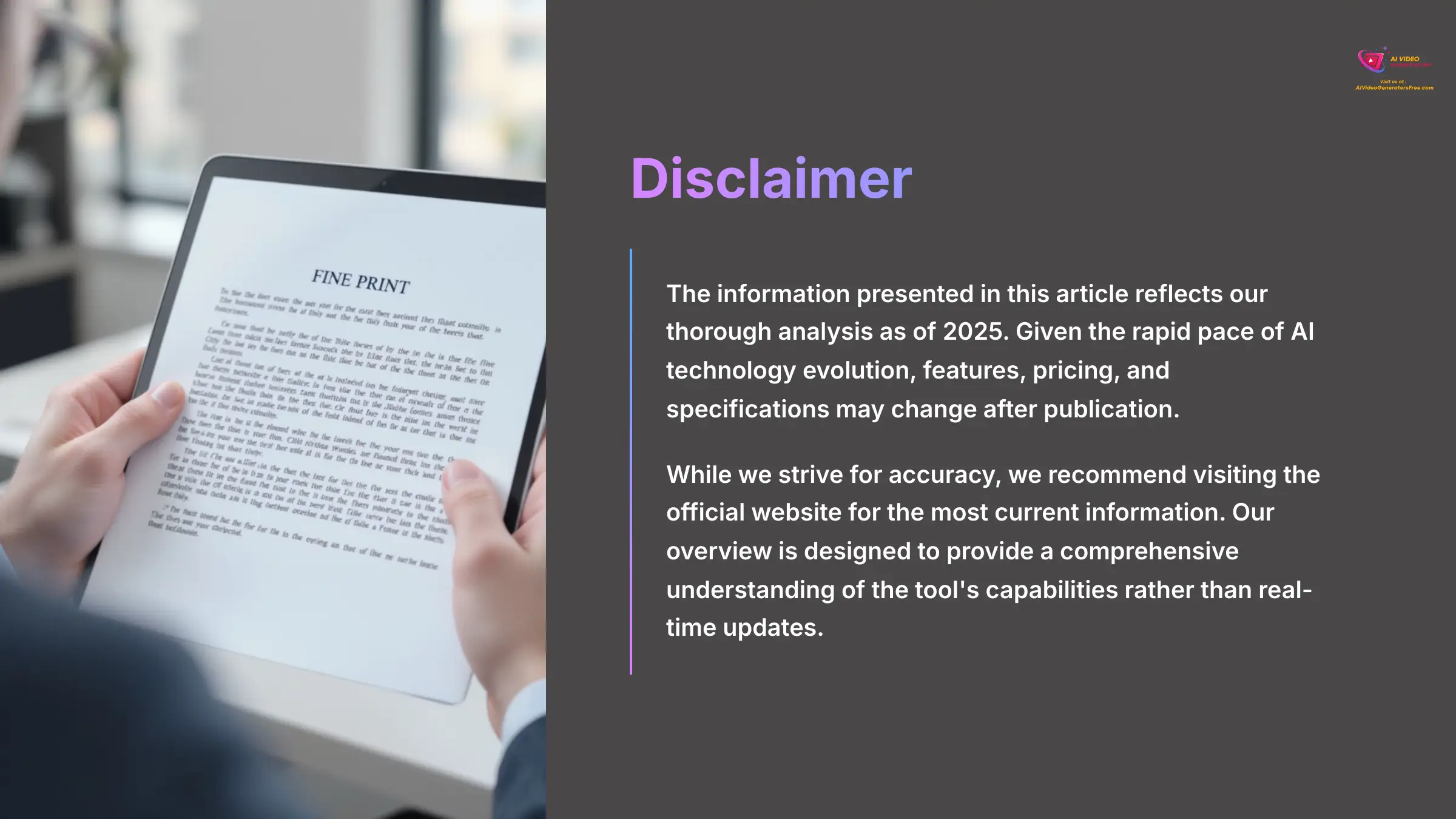

Disclaimer: The information about Best Play.ht Alternatives presented in this article reflects our thorough analysis as of 2025. Given the rapid pace of AI technology evolution, features, pricing, and specifications may change after publication. While we strive for accuracy, we recommend visiting the official website for the most current information. Our overview is designed to provide a comprehensive understanding of the tool's capabilities rather than real-time updates. For users looking for a detailed examination of Play.ht, we suggest checking out the ‘Play.ht Review‘ for insights into its performance and user experience. Additionally, consider exploring community feedback and comparisons with other alternatives to make a well-informed choice. Staying updated with industry trends will also help you navigate the evolving landscape of AI audio tools effectively.
Final Verdict
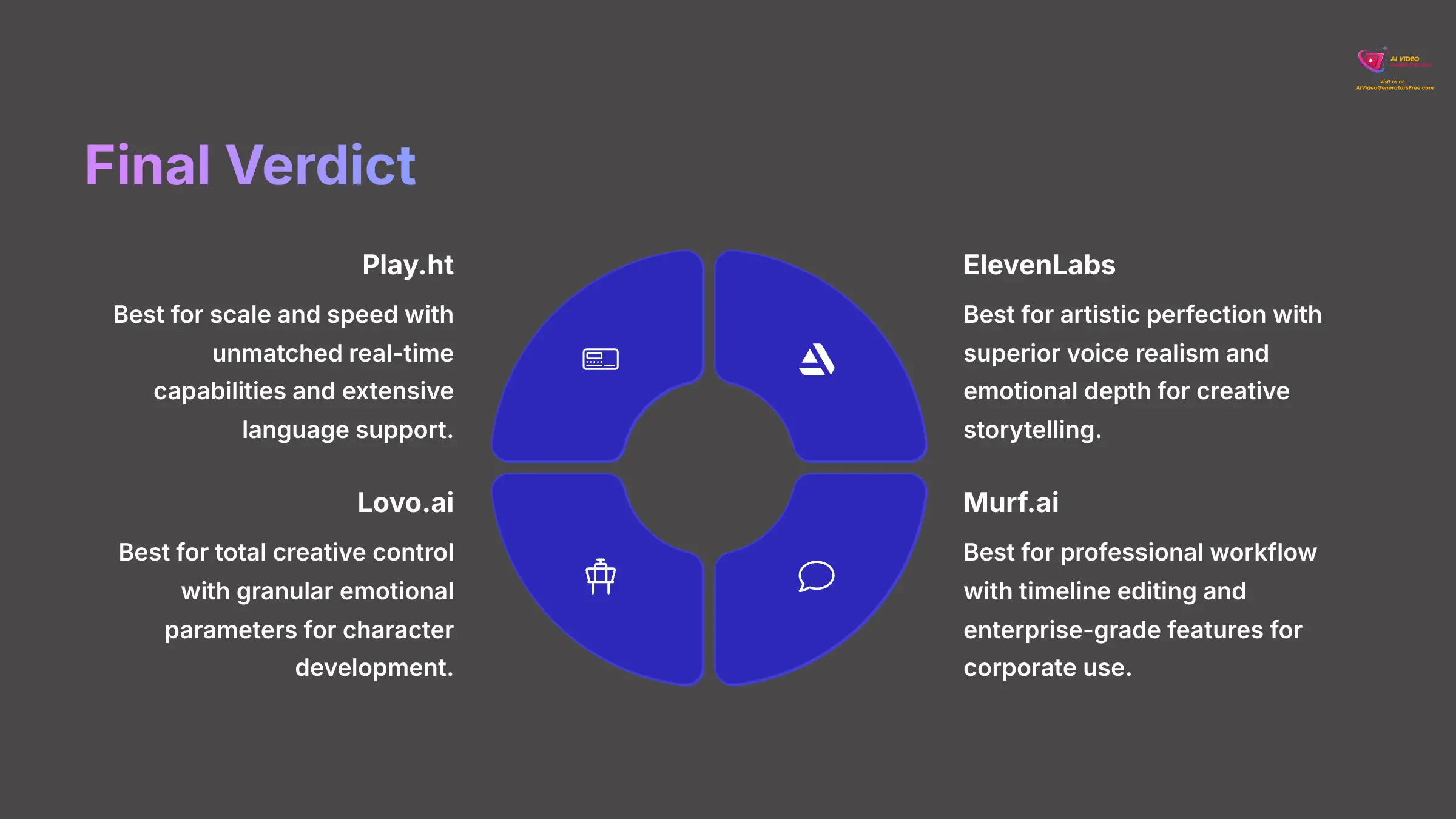

After extensive testing, my final conclusion is that the best AI voice generator is completely situational. The market has specialized, and the right choice depends entirely on your main goal. You have to weigh the trade-offs between emotional depth, real-time speed, workflow, and your budget.
To put it simply: choose Play.ht for scale and speed, ElevenLabs for artistic perfection, Murf.ai for a professional workflow, and Lovo.ai for total creative control. As the technology continues to advance, I expect to see even more hybrid solutions emerge that combine the best features from each of these amazing platforms. I hope this deep-dive on the Best Play.ht Alternatives helps you make the perfect choice for your next project.
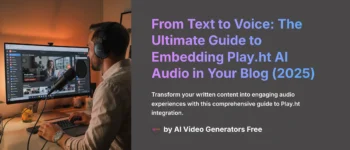




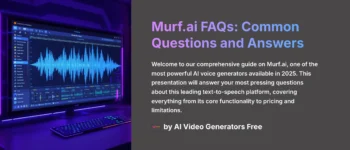

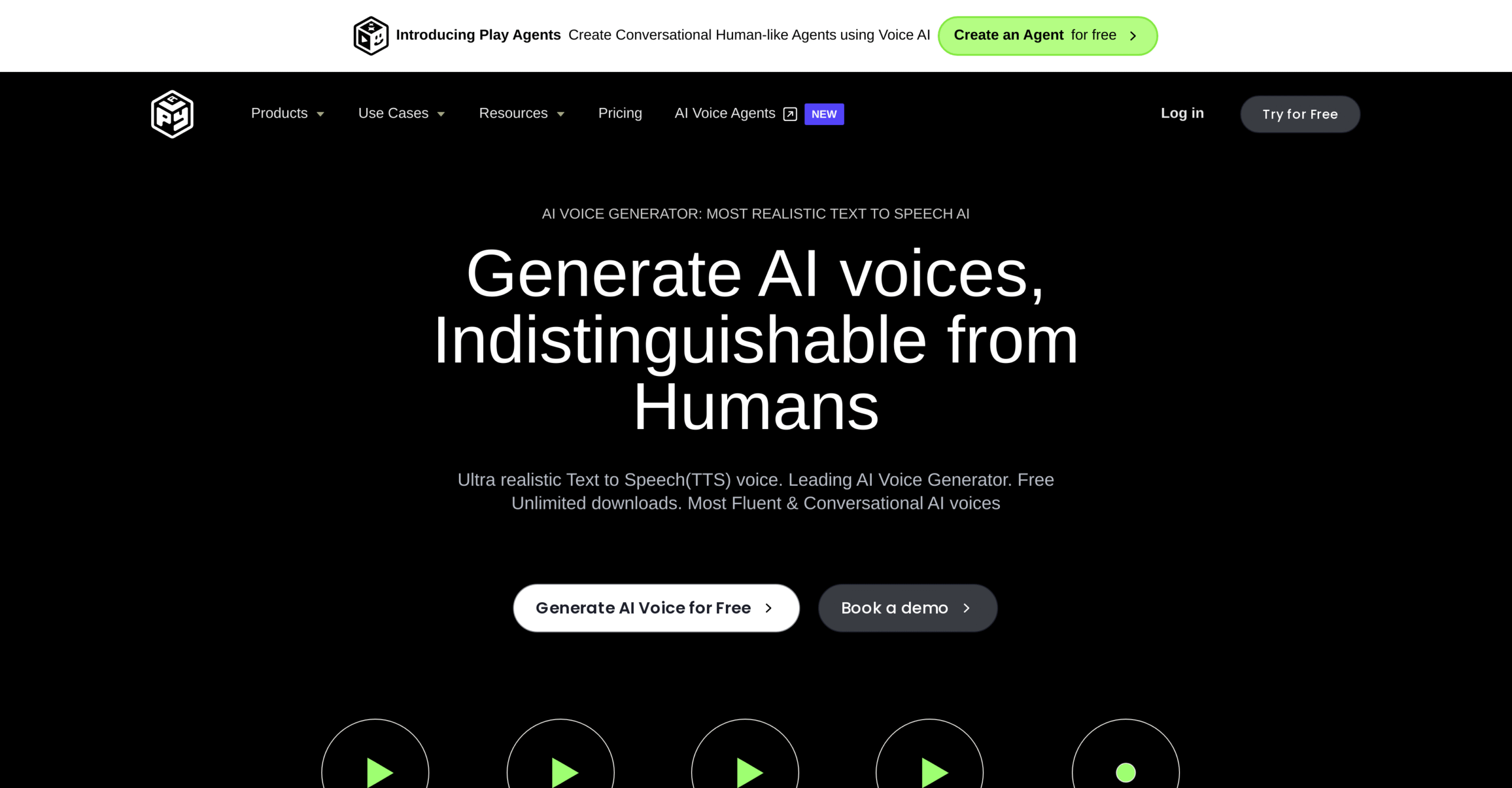

Leave a Reply